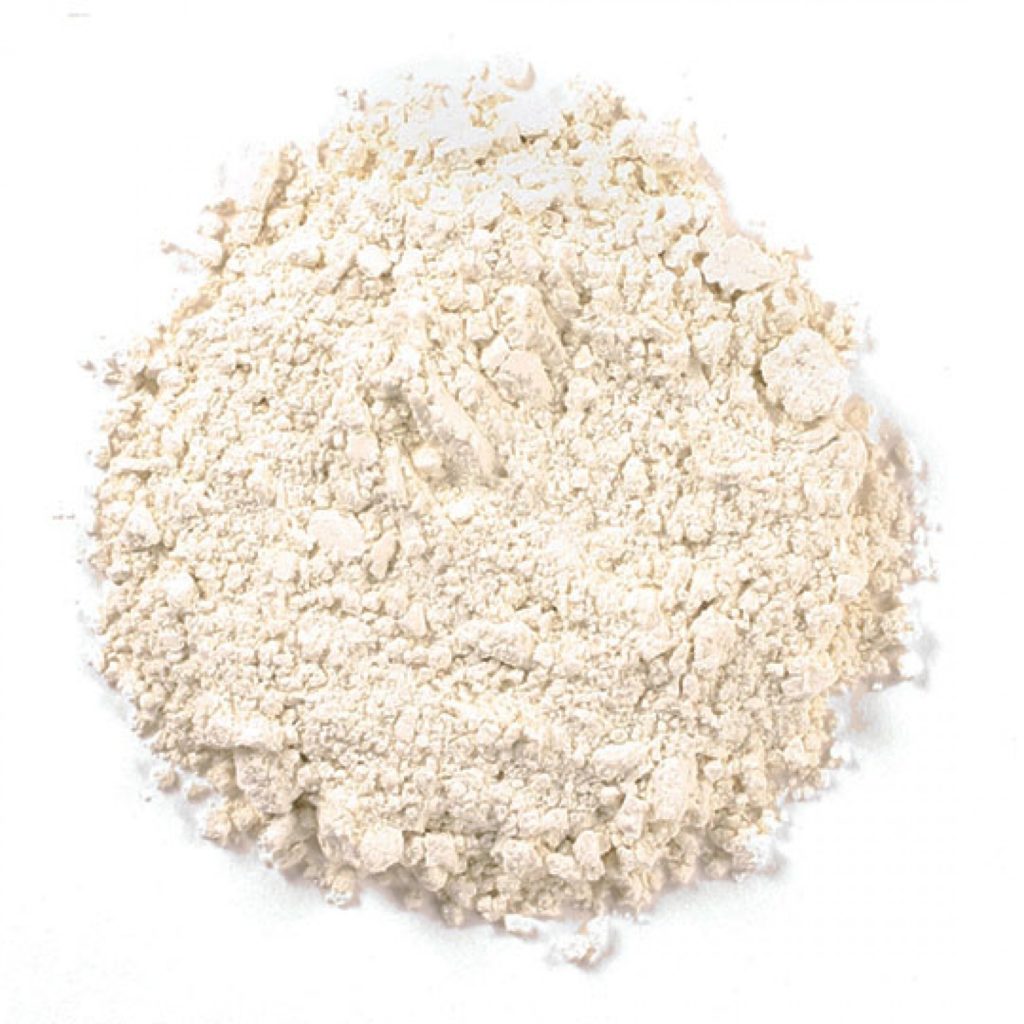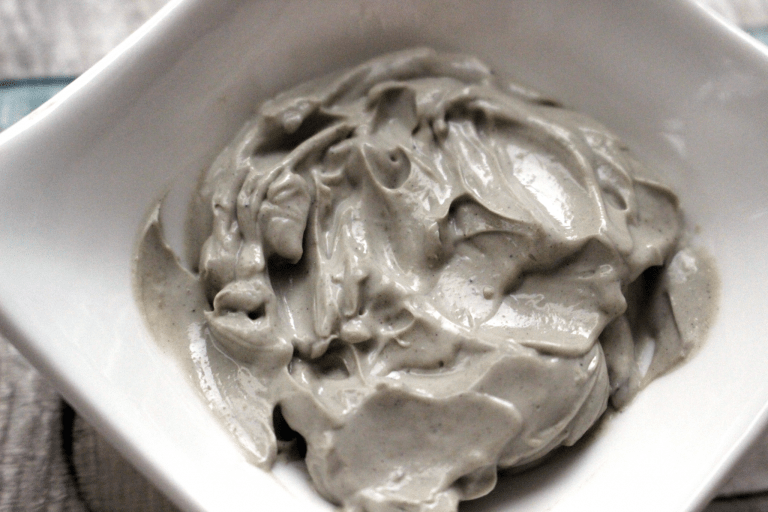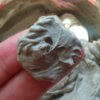We all know about bentonite clay face masks, but what about bentonite clay hair masks? Bentonite clay has been used for centuries for a number of different things, including face masks, but now, bentonite clay hair mask recipes are making a big splash. For natural hair especially, bentonite clay is said to be a clarifier which draws out impurities and reduces flakiness. Much like the same way bentonite clay works on skin, it also works on hair.
Those with natural hair that have used a bentonite clay hair mask have reported moisturized, frizz free, shiny, and curl defined hair. Does it really work though? We dug in a little deeper to see if bentonite clay hair mask recipes are all they’re cracked up to be!
Bentonite Clay Explained

Clay has actually been used by people for thousands of years for a number of different things. At its source, bentonite is sourced from volcanic ash and is an absorbent aluminium phyllosilicate clay. What this means is that the bentonite can get rid of toxins with a negative charge, whether this be internally or externally, such as on skin or hair.
What Are the Benefits of Bentonite Clay for Natural Hair?

Many people ask this question, and we’re here to answer it! Although there has been no scientific proof, bentonite clay has been used for hundreds (if not thousands) of years to soften and cleanse natural hair. There IS concrete evidence, however, that bentonite clay is very beneficial to the skin, and is therefore beneficial to the scalp. A healthy scalp means healthy hair.
Bentonite clay is great for those with natural hair, itchy scalp, and those who suffer from dandruff. The clay cleanses and exfoliates the scalp, and in turn, softens the hair, and also encourages hair growth. Bentonite clay also creates a protective barrier and helps to heal minor wounds. See more benefits of bentonite clay!
DIY Bentonite Clay Hair Mask Recipe

This DIY recipe is all natural and uses bentonite clay, water or apple cider vinegar, and essential oils (optional). Depending on the type of hair you have, you may want to add additionally ingredients, such as carrier oils, but they can also be left out. We love using bentonite clay in conjunction with apple cider vinegar, but you can also use water.
One very important thing to remember when making a bentonite clay mask (whether it be for the face or for the hair), is to use non-metal bowls and stirring utensils. This is because the clay absorbs the metals and becomes less effective.
Ingredients:
- 1/2 cup bentonite clay powder (we like Aztec Secrets Indian Healing Clay)
- 3-9 tbsp water (this is dependent on whether or not you’re using apple cider vinegar or essential oils).
- 6 tbsp apple cider vinegar – optional (if not using ACV, use water)
- 3 tbsp carrier oil of your choice – coconut, olive, almond, avocado, etc…
- non metal bowl and utensils
Directions:
- Start by measuring the bentonite clay and add to a non-metal bowl.
- If using any carrier oils, mix them in with the clay now.
- Then, add your water or apple cider vinegar and stir the concoction using a wooden or plastic utensil.
- Let the mask aerate for a few seconds.
- Stir really well until the consistency is yogurt-like.
- If you feel like the mask is too thick, add a little bit more water.
- If it’s too thin, add a little bit more clay.
How to Use the Bentonite Clay Hair Mask
This mask should be applied to wet or damp hair. This does not mean you have to wash your hair before a bentonite clay mask. It simply means the hair should be wet, so just a quick rinse is enough. The most important thing to remember is to saturate the entire head. If your strands get dry during the process, be sure to have a spray bottle with water nearby.
After hair is fully saturated, you can leave it as in, or, you can wrap the hair in plastic wrap for extra penetration. Leave it on for about 25 minutes. Once the 25 minutes are up, go ahead and wash out the hair mask. This is a very important step, because this is where you’re trying to rid the scalp of dead skin cells and cleanse the scalp so that it can breathe. Be sure to remove every trace of the mask by gently massaging the scalp and rinsing. Follow up with shampoo and conditioner.
Check out this YouTube video courtesy of Tiffany TV to see how exactly to apply a bentonite clay hair mask to your hair.
Bentonite Clay Dangers
Are there any dangers to using bentonite clay? Although there have been no scientific studies proving that bentonite clay is beneficial to the hair, it HAS been used for thousands of years to treat a number of scalp ailments.
The only thing you really have to watch out for, is that bentonite clay contains trace amounts of lead, much like some foods we regularly consume such as sweet potatoes and carrots.
Bentonite clay contains up to 37.5 micrograms of lead per gram, and can get absorbed into the skin. About 23% of lead applied to the skin can actually enter the bloodstream. Fortunately though, bentonite clay has been used by thousands of people for a very long time, and there have been no known adverse effects.
Those who are susceptible to lead toxicity should take caution though and consult a health care practitioner. Like with anything though, before using bentonite clay, be sure to do a patch test to make sure you’re not allergic.
Have you used a bentonite clay hair mask before? Let us know how it worked for you in the comments below!
Bentonite Clay Hair Mask Recipe

This bentonite clay hair mask recipe is super quick and easy and will cleanse and heal the scalp encouraging hair growth and promoting strength and shine.
- 1/2 cup bentonite clay powder
- 3-9 tbsp water (this is dependent on whether or not you're using apple cider vinegar or essential oils)
- 6 tbsp apple cider vinegar (optional – if you're not using apple cider vinegar, use water instead)
- 3 tbsp carrier oil of your choice (you can use coconut oil, olive oil, avocado oil, almond oil, etc…)
Start by measuring the bentonite clay and add to a non-metal bowl.
If using any carrier oils, mix them in with the clay now.
Then, add your water or apple cider vinegar and stir the concoction using a wooden or plastic utensil.
Let the mask aerate for a few seconds.
Stir really well until the consistency is yogurt-like.
If you feel like the mask is too thick, add a little bit more water. If it's too thin, add a little bit more clay.
Saturate wet or damp hair and leave on for 25 minutes. Rinse out while massaging the scalp, and follow up with shampoo and conditioner.
Like this post? Share it 🙂

What does bentonite clay do to your hair?
Hi SandraMay,
Bentonite clay contains lots of natural minerals which are very beneficial for your hair. It is antimicrobial and will help with an itchy scalp as well as help to prevent flakes. Furthermore, it can help encourage hair growth!